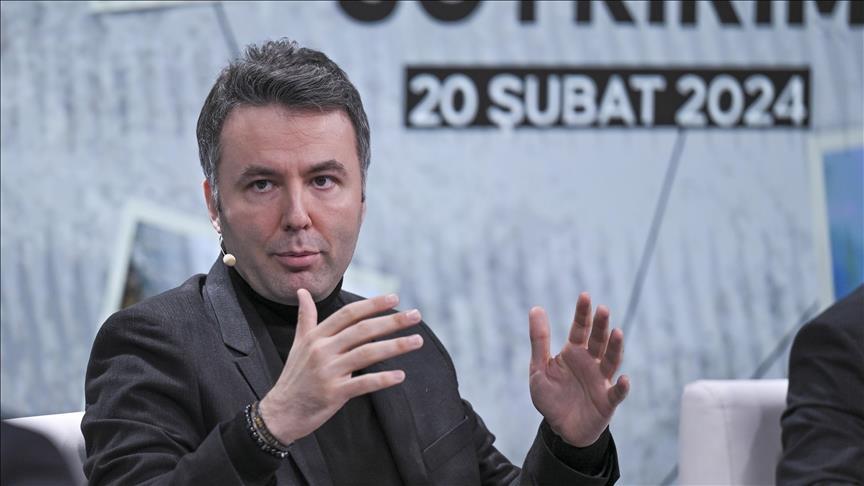Journalist Mehmet Akif Ersoy, AA Middle East News Director Turgut Alp Boyraz, International Law Department Lecturer Assoc. Dr. Hakan Erkiner from Marmara University Faculty of Law and International Relations Lecturer Assoc. Dr. Şuay Nilhan Açıkalın from Hacı Bayram Veli University International Relations Department participated as a speaker.
In the panel moderated by AA Visual News Director Fırat Çağlayan Yurdakul, a video was shown expressing the sadness of AA cameraman Muhammed al-Alul, who lost his 4 children and 3 siblings in Israel's attack on Gaza.

Psychological challenges
AA Middle East News Director Boyraz pointed out that reporters in Gaza have a difficult job in the conflict zone, and stated that those who make news outside the Gaza border are also under psychological pressure.

Boyraz explained that Israel puts pressure on journalists in two ways, the first of which is the pressure applied to the publication where the journalist works, and the second is the pressure on individual journalists.
Noting that there is a huge lynching culture in the international press, Boyraz said that the world extended credit to Israel for eliminating Hamas after October 7.
Boyraz pointed out that after tens of thousands of people died, people living in the capitals of Western countries took to the streets to stop Israel's attacks and said, "Everyone started talking about what Israel did. Israel does not want any of this to be talked about."

"Most of those working in the international media cannot handle the pressure"
Reminding that 130 journalists lost their lives in Gaza, Boyraz stated that all journalists, including AA employees, work in the same psychological state.
Pointing out that journalists should face the pressure of being targeted by Israel, Boyraz said, "Most of those working in the international media do not face this pressure. They do not want to confront Israel."
Journalism in the war zone
Reminding that he was in Gaza during the attacks in 2012 and 2014, journalist Ersoy said, "There is a huge difference between telling the story from where the bomb fell and telling the story from where the bomb was thrown." said.

Stating that they went to Israel or the West Bank with the feeling that they were "not safe", Ersoy said that he and other journalists took steel vests and helmets with them.
Ersoy stated that there is a perception in Turkey that he is working in the conflict zone in Gaza, but this is not true and he is not a journalist in Gaza.
Stating that they were broadcasting from outside Gaza while journalists in Gaza lost their lives and families, Ersoy said, "We did not actually witness the story, but we are telling it as if we were reporting it from the scene. We tried to tell Gaza from Israel."

"Normalization" of attacks in Gaza
Stating that Israel's first attacks on hospitals, children and journalists were discussed by the whole world, Ersoy emphasized that many more hospitals were hit and many more children and journalists were killed, but this is not discussed anymore.
"AA's work is very valuable"
Ersoy stated that there is a struggle to create perception and that it is important who will shape the perception at the global level, and explained that AA employees did important work at critical moments in Gaza.
Ersoy noted that journalists from outside could not enter Gaza, so many events could not be reported, and underlined that AA's "Evidence" book was very valuable in terms of reflecting what was happening in Gaza.
Emphasizing the impact of AA's photography of Israel's use of phosphorus bombs in Gaza, Ersoy said that AA's news feeds the journalists working in television channels in terms of news.
Disproportionate use of force "illegitimate"
Assoc. Dr. Erkiner stated that Israel "immediately" started to use armed force in Gaza after October 7, and stated that the use of armed force was "regulated" in two ways in terms of international law.

Erkiner stated that regardless of the "qualification of the October 7 attacks in international law", this use of force is "illegitimate" if the response is disproportionate.
Decision of the International Court of Justice
Referring to the decision of the International Court of Justice (ICJ) on January 26, Erkiner stated that it is expected that Israel will also blame the ICJ and South Africa.Erkiner also emphasized that Israel is "unfair" in the field of "international law".
Referring to the "violation" rules in international law, Erkiner pointed out that Israel should not be allowed to "usurp its rightfulness".
Erkiner also referred to AA's activities in the region and underlined that these studies are meaningful against Israel's "disinformation".
Stating that it is important to continue collecting "evidence" against Israel's actions, Erkiner stated that this evidence can also be presented in international cases.

Israel's past cases
Erkiner also reminded of the article of the 1948 United Nations (UN) Convention on the Prevention and Punishment of Genocide and the cases heard in Israel in the past.
"AA actually created a psychological break by breaking this censorship"
Assoc. Dr. Açıkalın stated that thanks to AA's evidentiary publications, the truth is being talked about all over the world, and said, "While everyone in the world supports Israel or fears Israel, I think Turkey and the Agency's taking such a precaution reminded us of the existence of an Agency that is truly worthy of a Turkish nation.”

Açıkalın said that a psychological breaking point occurred when AA shared its evidentiary publications with the world public opinion, and stated that this breaking point caused an increase in support rallies for Gaza around the world.
Açıkalın emphasized that the Western media implemented serious censorship on the issue and said, "Turkey and AA actually broke this censorship and created a psychological break."
Elections in the USA and Europe
Açıkalın said that the issue of influencing the governments of the masses has become critical, especially during election periods, and reminded that this year is an election year both in the USA and throughout Europe.
